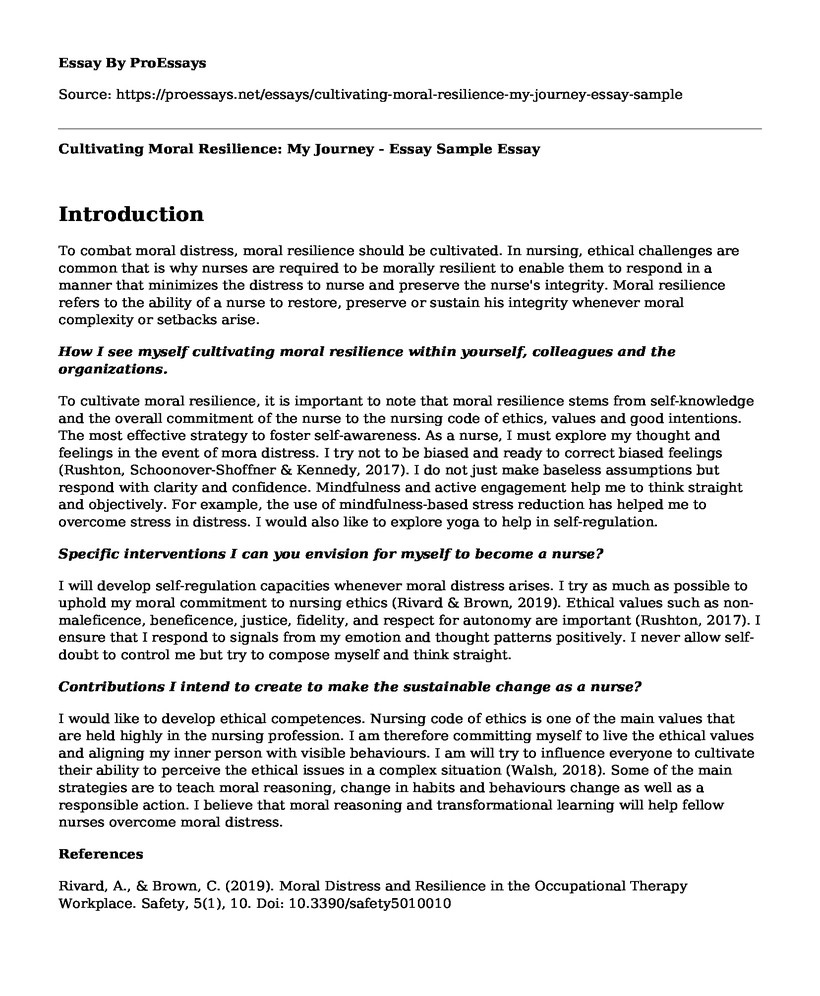Introduction
To combat moral distress, moral resilience should be cultivated. In nursing, ethical challenges are common that is why nurses are required to be morally resilient to enable them to respond in a manner that minimizes the distress to nurse and preserve the nurse's integrity. Moral resilience refers to the ability of a nurse to restore, preserve or sustain his integrity whenever moral complexity or setbacks arise.
How I see myself cultivating moral resilience within yourself, colleagues and the organizations.
To cultivate moral resilience, it is important to note that moral resilience stems from self-knowledge and the overall commitment of the nurse to the nursing code of ethics, values and good intentions. The most effective strategy to foster self-awareness. As a nurse, I must explore my thought and feelings in the event of mora distress. I try not to be biased and ready to correct biased feelings (Rushton, Schoonover-Shoffner & Kennedy, 2017). I do not just make baseless assumptions but respond with clarity and confidence. Mindfulness and active engagement help me to think straight and objectively. For example, the use of mindfulness-based stress reduction has helped me to overcome stress in distress. I would also like to explore yoga to help in self-regulation.
Specific interventions I can you envision for myself to become a nurse?
I will develop self-regulation capacities whenever moral distress arises. I try as much as possible to uphold my moral commitment to nursing ethics (Rivard & Brown, 2019). Ethical values such as non-maleficence, beneficence, justice, fidelity, and respect for autonomy are important (Rushton, 2017). I ensure that I respond to signals from my emotion and thought patterns positively. I never allow self-doubt to control me but try to compose myself and think straight.
Contributions I intend to create to make the sustainable change as a nurse?
I would like to develop ethical competences. Nursing code of ethics is one of the main values that are held highly in the nursing profession. I am therefore committing myself to live the ethical values and aligning my inner person with visible behaviours. I am will try to influence everyone to cultivate their ability to perceive the ethical issues in a complex situation (Walsh, 2018). Some of the main strategies are to teach moral reasoning, change in habits and behaviours change as well as a responsible action. I believe that moral reasoning and transformational learning will help fellow nurses overcome moral distress.
References
Rivard, A., & Brown, C. (2019). Moral Distress and Resilience in the Occupational Therapy Workplace. Safety, 5(1), 10. Doi: 10.3390/safety5010010
Rushton, C. (2017). Cultivating Moral Resilience. AJN, American Journal of Nursing, 117, S11-S15. Doi: 10.1097/01.naj.0000512205.93596.00
Rushton, C., Schoonover-Shoffner, K., & Kennedy, M. (2017). Executive Summary. Journal Of Christian Nursing, 34(2), 82-86. Doi: 10.1097/cnj.0000000000000386
Walsh, J. (2018). Care, Commitment and Moral Distress. Ethical Theory and Moral Practice, 21(3), 615-628. Doi: 10.1007/s10677-018-9911-9
Cite this page
Cultivating Moral Resilience: My Journey - Essay Sample. (2023, Feb 27). Retrieved from https://proessays.net/essays/cultivating-moral-resilience-my-journey-essay-sample
If you are the original author of this essay and no longer wish to have it published on the ProEssays website, please click below to request its removal:
- Opinion on the Policy of Eliminating Sporting Time
- Diabetes Management in Primary Care Research
- Paper Example on Electronics Health Records (EHR)
- The Role of the Advanced Practice Nurse - Essay Sample
- Essay on Clinical Interviewing: Examining Intake, Assessment & Therapeutic Alliance
- Essay Example on Modern Health Care: Neglect of Nursing Management?
- COVID-19: Drying Up Business Taxes & Impacting the US Economy - Essay Sample







